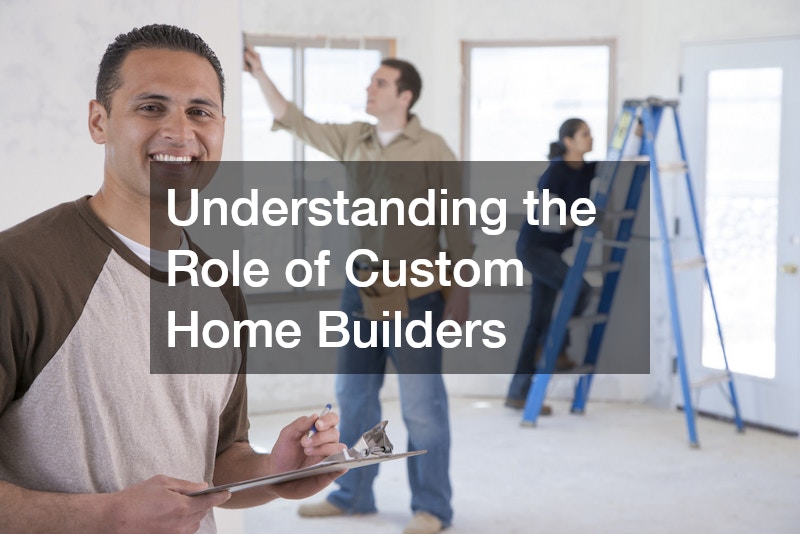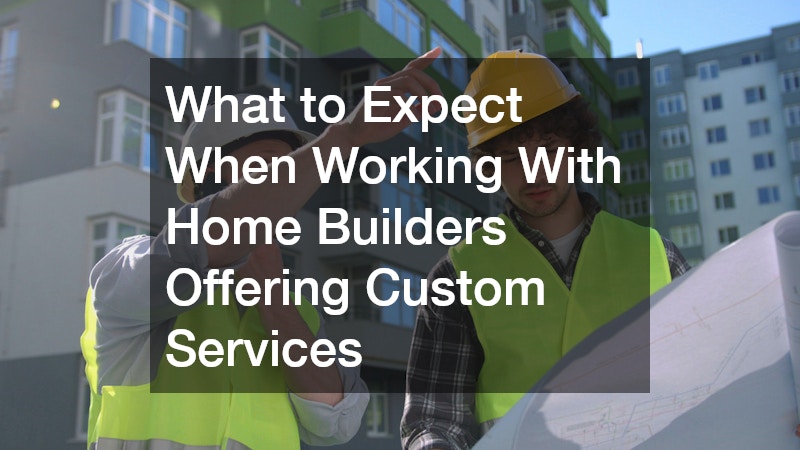- 👷️ Custom home builders offer personalized design options tailored to your lifestyle and preferences.
- 📟 The process begins with a detailed consultation to discuss vision, budget, and expectations.
- 📊 From layout to finishes, you’ll work with architects and designers to create your dream home.
- ⏳ The custom building process is typically longer but offers higher quality and satisfaction.
- ↺ Expect consistent communication, project milestones, and opportunities for mid-project updates.
- ✅ Final walkthroughs, inspections, and warranty support ensure your home meets high standards.
- 💡 Choosing the right builder is key — reputation, communication, and transparency matter most.
Understanding the Role of Custom Home Builders

Homebuilders that offer custom services do far more than build houses — they craft personalized living experiences. Unlike volume or production builders who follow pre-set blueprints and designs, custom home builders work one-on-one with homeowners to bring unique visions to life.
Custom builders manage everything from initial planning and architectural design to material selection and post-construction support. Many of them offer design-build services, meaning they handle both the creative and construction phases under one roof. This ensures smoother communication, fewer surprises, and a higher degree of customization throughout the project.
You’re not just choosing countertops or paint colors — you’re deciding how each room will function and reflect your lifestyle, whether that’s a home office with built-in shelves, a dog-washing station in the mudroom, or aging-in-place accommodations for the future. Homebuilders that offer custom services become long-term collaborators who transform your daily needs into livable design.
The Initial Consultation – Setting the Foundation
Every successful custom home project starts with a clear and collaborative consultation. During this phase, you’ll meet with your chosen builder to lay the groundwork and ensure you’re aligned before any major commitments.
What to expect during the consultation:
- In-depth discussion of your vision, needs, and preferences.
- Review of past work, portfolios, and architectural styles.
- Preliminary budget conversations and feasibility checks.
- Site evaluation if you already own land.
- Timeline expectations and potential constraints.
Reputable homebuilders that offer custom services will ask questions about your daily routines, long-term plans, and must-have features to help tailor the home to your lifestyle. For example, someone who works from home might prioritize natural lighting and soundproof office space, while a large family might need an open-concept kitchen with ample storage. This session is also where you gauge their listening skills, communication style, and creativity — all essential traits for a successful collaboration.
Budgeting and Financial Planning
One common misconception is that custom homes are only for the ultra-wealthy. In reality, working with home builders offering custom services allows for flexible budgeting. Costs can be adjusted by choosing different finishes, materials, and even structural layouts, allowing for customization within a realistic financial plan.
Financial aspects typically covered:
- Base cost per square foot (varies by location and complexity).
- Upgrades and custom features like high-end appliances or smart home systems.
- Permit and zoning fees depending on your municipality.
- Land preparation costs (grading, excavation, etc.).
- Contingency reserve, often recommended at 10–15% of the total budget.
Top-tier builders will provide transparent pricing in the form of a line-item estimate, showing where your money goes. They’ll also help you make value-engineered decisions to stay within budget without sacrificing quality. Choosing builders who offer open-book pricing models can help you stay informed and confident throughout the process.
Designing Your Dream Home With the Builder’s Team
This is where the magic happens. After initial approvals, your home’s design is translated into detailed plans. You’ll work with in-house or partnered architects, interior designers, and structural engineers to bring your ideas to life, ensuring that form meets function beautifully.
The design phase includes:
- Custom floor plan creation based on your lifestyle.
- Selection of materials, colors, and finishes (flooring, cabinetry, countertops).
- Decisions around energy efficiency, HVAC systems, and lighting.
- Reviewing 3D renderings or CAD models to visualize the space.
You’ll likely be asked to fill out a detailed “wish list” of needs and wants, which helps guide design decisions. A good homebuilder offering custom services will offer suggestions based on functionality, local trends, and resale value, helping you avoid costly or impractical designs. They may even connect you with a showroom or design studio to help you visualize your selections before building begins.
Timeline Expectations and Project Milestones
Unlike tract homes that may follow a standard 4–6 month timeline, custom home construction can take 9 to 18 months depending on size, location, and complexity. That said, the timeline is usually mapped out from the start and clearly communicated with milestone check-ins.
Typical custom home timeline:
- Design & Permitting: 1–3 months
- Site Prep & Foundation: 1 month
- Framing & Mechanical Systems: 2–3 months
- Interior Work (Drywall, Fixtures): 3–4 months
- Final Finishes & Walkthroughs: 1–2 months
Reputable homebuilders keep clients informed at each phase and alert them to possible delays such as bad weather, labor shortages, or material backlogs. Many use project management software or client portals for real-time updates. They may also provide you with a printed or digital timeline chart so you can track the construction process.
Communication During the Build Process

Working with home builders offering custom services means ongoing communication is the norm, not the exception. From framing to final touch-ups, you’ll be part of every step, which gives you peace of mind and control over the process.
Expect regular updates on:
- Construction milestones
- Scheduling changes or issues
- Budget revisions (if applicable)
- Material decisions and approvals
Builders may schedule biweekly site visits and send weekly photo or video updates. If any surprises arise (like hidden utility lines), you’ll be consulted before changes are made. Some firms offer mobile app access where you can approve selections, track progress, and communicate with your project manager in real time.
Open lines of communication are crucial for success — it’s one of the main benefits of working with smaller, more focused custom home construction teams rather than large-volume builders.
Customization Opportunities at Every Stage
One of the most exciting parts of building a custom home is the freedom to make changes — even during construction. While some changes may incur extra costs or time, reputable builders offer a degree of flexibility to accommodate evolving needs.
Common customization areas:
- Kitchens: Layouts, islands, appliances, and cabinet styles.
- Bathrooms: Tile work, fixtures, vanity sizes, and lighting.
- Living Areas: Built-ins, fireplace designs, ceiling details.
- Exteriors: Siding materials, porches, garages, landscaping.
Builders may also accommodate smart home systems, aging-in-place design features, or multi-generational living spaces — all increasingly popular in modern builds. Flexibility is a hallmark of homebuilders offering custom services, ensuring your home evolves with your vision throughout the build.
Quality Assurance, Final Walkthrough & Closing
Before move-in day, your builder will arrange a final walkthrough, also known as a punch list inspection. This is your opportunity to identify any minor issues (like paint touch-ups, cabinet alignment, etc.) and ensure everything meets expectations.
What to expect during this phase:
- Detailed inspections of plumbing, electrical, HVAC.
- Final product checks (fixtures, finishes, flooring).
- Review of the warranty packet and homeowner manual.
- Scheduling of any follow-up corrections.
Reputable builders also conduct their own multi-point inspections and may offer third-party quality assurance to verify structural integrity, safety standards, and code compliance. They walk you through all home systems (like thermostats, water heaters, and smart controls) and answer final questions.
Post-Construction Support and Warranties
Just because the build is done doesn’t mean the relationship ends. Homebuilders that offer custom services typically provide post-construction support, which may include:
- 1-year workmanship warranty for defects in labor or materials.
- 10-year structural warranty for foundation or framing issues.
- Access to a dedicated service team for future repairs or upgrades.
This aftercare demonstrates long-term accountability — something you often don’t get with production builders. Many also offer post-occupancy check-ins at 30 or 90 days to address any early issues.
Tips for a Smooth Custom Home Building Experience
To make the most of your journey with a custom builder, consider these proven strategies:
- ✅ Start with a clear vision but remain open to expert input.
- ✅ Vet your builder thoroughly — check references, reviews, licenses, and past projects.
- ✅ Put everything in writing, including changes and allowances.
- ✅ Visit the site regularly and stay involved in key decisions.
- ✅ Be patient — the extra time leads to a superior outcome.
A little preparation goes a long way in ensuring your home is exactly what you envisioned — and more.
Conclusion
Working with home builders offering custom services is an exciting, collaborative, and deeply personal experience. From the first sketch to the final inspection, you have control over how your home looks, functions, and feels. While the process demands more involvement, the payoff is a uniquely tailored space that fits your life, style, and values.
With the right builder by your side — one who values communication, transparency, and craftsmanship — the journey becomes as rewarding as the destination.
Sources:
❓ Frequently Asked Questions
1. What should I expect from home builders offering custom services?
You should expect personalized service from start to finish, including one-on-one design consultations, material flexibility, transparent quotes, and regular updates throughout the project. A local home builder experienced and trusted will help you tailor every aspect of the home to fit your lifestyle, family needs, and design preferences.
2. How are custom home builders different from standard home builders?
Custom home builders create one-of-a-kind homes, allowing you full control over the design, layout, and materials. In contrast, production or standard home builders often work with pre-designed plans and limit customization. An experienced home builder with good reviews will listen to your vision and create a truly personalized space.
3. How do I know if a builder truly offers custom services?
You can verify this by:
-
Asking for a portfolio of custom-designed homes
-
Checking if they allow layout changes, material selections, and design modifications
-
Ensuring they offer in-depth planning sessions and consultations
-
Reading reviews from homeowners who describe tailored solutions
Working with a custom home builder with experience means you’ll have more flexibility at every stage.
4. Is working with a custom home builder more expensive?
Yes, custom homes often involve higher initial costs, but they can provide greater long-term value. You won’t need costly remodeling later because everything is designed to your exact specifications. Many homeowners see it as an investment in comfort, lifestyle, and future resale value.
5. What timeline can I expect when building a custom home?
Timelines for custom homes can range from 9 to 18 months, depending on:
-
The complexity of the design
-
Local permit approvals
-
Site preparation and weather conditions
-
Material availability and subcontractor scheduling
A trusted home builder near you should provide a projected schedule and communicate updates clearly.
6. Should I hire an architect or will a custom builder provide design help?
Most experienced custom home builders either have in-house architects or partner with design professionals. This can save you time and money. If you want highly technical or stylistic design work, you may still choose to hire an independent architect. Always discuss this with your builder before finalizing your agreement.

